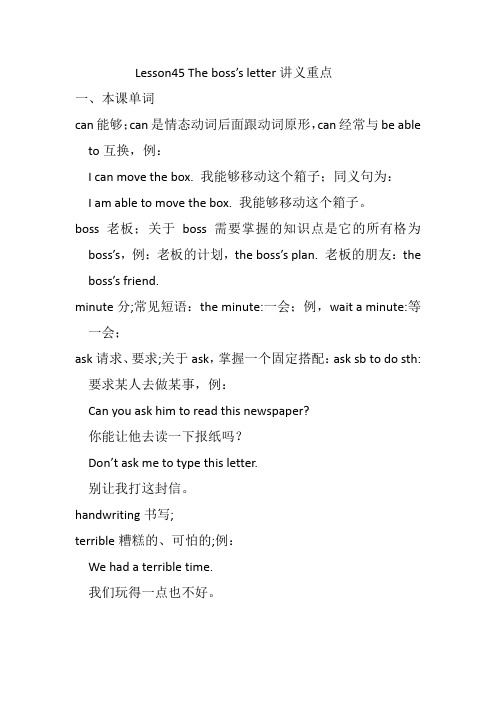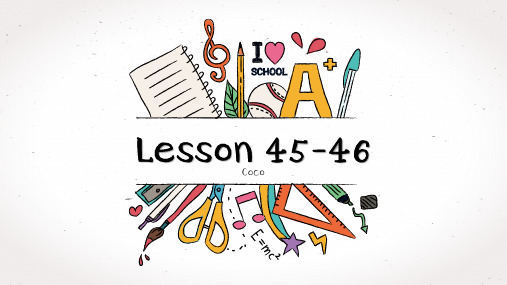新概念英语第一册第45课Lesson45课文单词知识点讲解学习
新概念一第45-48笔记

新概念一第45-48笔记第一篇:新概念一第45-48笔记新概念一第45-46课重点和难点:情态动词(2)vocabulary1.boss n.老板,工头,上司vt.当……的头;指挥,支使boss about把…..差来差去,对……发号施令2.minute n.分钟/备忘录,记录(at)any minute马上,随时every minute时时刻刻地,迫不及待地in a minute立刻minute hand(钟表的)分针,长针(时针为hour hand, 秒针为second hand)ten minutes to seven差10分7点2.lift n.抬起,提升/电梯go by lift乘电梯上去a lift in one’s career事业的进展lift one’s head抬起头lift up one’s ears竖起耳朵听4.cake n.蛋糕,糕饼或蛋糕a cake of soap一块肥皂a cake of mud一块泥土an ice cake冰块a potato cake土豆饼5.biscuit n.饼干/软烤小圆饼take the biscuit中头奖;出人意料的好(或坏)Key structures:1.Can you come here a minute please, Bob?请你过来一下好吗?PS: a minute 一会儿,不能译成“一分钟”,在句中作状语,相当于:Can you come here for a while please, Bob?2.She’s next door.她在隔壁。
Next door起副作用,作表语,意为隔壁。
3.The boss’s handwriting is terrible!Boss’s是名词所有格,主义其读音。
类似如:Tom’s shoes(汤姆的鞋),Xiao Wang’s company(小王的公司)。
Handwriting书写,是一个抽象名词,只能当作单数使用。
新概念英语第一册L45

Is the boss’s handwriting terrible?
What … like?
What’s the boss’s handwriting like?
See you!
Can Bob go into the boss’s office?
Where…?
Where can Bob go?
ask me if
Ask me if Pamela is next door?
Is Pamela next door?
Where…?
Where is Pamela?
ask me if
Lesson 45 The boss’s letter
can
The girl can ride a bike.
He can’t see.
boss
minute
hour second
ask
?
hanwords
• • • • • • can[kæ n] 能够 boss[bɔs] 老板 minute[`minit] 分钟 ask[ɑ:sk] 请求,要求 handwriting[`hæ ndraitiŋ] 书写 terrible[`terəbl] 糟糕的
Unit 23
Can you come here a minute please, Bob?
Yes, sir?
Can you come here a minute please, Bob?
Yes, sir?
New words
can 能够
Can you make the tea? Can you be my girlfriend? 过去式could, 表请求时,语气更委婉些
新概念英语45课讲义

Lesson45 The boss’s letter讲义重点一、本课单词can能够;can是情态动词后面跟动词原形,can经常与be able to互换,例:I can move the box. 我能够移动这个箱子;同义句为:I am able to move the box. 我能够移动这个箱子。
boss 老板;关于boss需要掌握的知识点是它的所有格为boss’s,例:老板的计划,the boss’s plan. 老板的朋友:the boss’s friend.minute分;常见短语:the minute:一会;例,wait a minute:等一会;ask请求、要求;关于ask,掌握一个固定搭配:ask sb to do sth:要求某人去做某事,例:Can you ask him to read this newspaper?你能让他去读一下报纸吗?Don’t ask me to type this letter.别让我打这封信。
handwriting书写;terrible糟糕的、可怕的;例:We had a terrible time.我们玩得一点也不好。
二、本课重要知识点1. What is the matter?怎么了?这是新概念英语中非常重要的一个知识点,经常用来询问人和事物的状况,常作“怎么了”“是否有问题”“是否有麻烦讲”,可单独使用也可跟with一起联合使用,掌握以下三点即可:①单独使用时相当于汉语的“怎么了”例:What is the matter?怎么了?I lost my keys. 我钥匙丢了。
②What is the matter with:、、、、怎么了?What is the matter with the machine?这台机器怎么了?③What is wrong with:、、、怎么了?What is wrong with you?你怎么了?What is the matter? 与what is wrong?这两个句型所要表达的意思基本相同,可以互换,多见于同义句转换,例:What is the matter with you?(同义句转换)What is wrong with you?你怎么了?2. Can you come here a minute please?请你来一下好吗?在本句中我们继续上节课的情态动词的用法总结。
新概念英语第一册第45-46课The boss's letter

新概念英语第一册第45-46课:The boss's letterLesson 45 The boss's letter老板的信Listen to the tape then answer this question. Why can't Pamela type the letter?听录音,然后回答问题。
帕梅拉为什么无法打信?THE BOSS: Can you come here a minute please, Bob?老板:请你来一下好吗?鲍勃?BOB: Yes, sir?鲍勃: 什么事,先生?THE BOSS: Where's Pamela?老板:帕梅拉在哪儿?BOB: She's next door.She's in her office, sir.鲍勃: 她在隔壁,在她的办公室里,先生。
THE BOSS: Can she type this letter for me?Ask her please.老板:她能为我打一下这封信吗?请问她。
BOB: Yes, sir.鲍勃: 好的,先生。
BOB: Can you type this letter for the boss please, Pamela? 鲍勃: 请你把这封信给老板打一下可以吗,帕梅拉?PAMELA: Yes, of course I can.帕梅拉:可以,当然可以。
BOB: Here you are.鲍勃: 给你这信。
PAMELA: Thank you, Bob.帕梅拉:谢谢你,鲍勃。
PAMELA: Bob!帕梅拉:鲍勃!BOB: Yes?What's the matter.鲍勃: 怎么了?怎么回事?PAMELA: I can't type this letter.帕梅拉:我打不了这封信。
PAMELA: I can't read it!帕梅拉:我看不懂这封信,The boss's handwriting isterrible!老板的书写太糟糕了!New Word and expressions生词和短语canmodal verb 能够bossn. 老板,上司minuten. 分(钟)askv. 请求,要求handwritingn. 书写terribleadj. 糟糕的,可怕的Notes on the text课文注释1 Can you come here a minute please, Bob?句中的can是情态动词,表示“能力”。
新概念Lesson 45-46(第二课时)

lift the table 举起桌子 lift the chair 搬起凳子
他能举起桌子吗? Can he lift the table?
No,he can’t. He can’t lift the table, but he can lift the chair.
★ lift v. 拿起,搬起,举起 lift sth. 举起···
可以指心情,天气,相貌, 味道等 1. 糟糕的 How are you today? Terrible!
My handwriting is terrible.
Wang Xizhi’s handwriting is good. 25
★ terrible /`terəbl/ adj.糟糕的,可怕的
2. 可怕的 My sister is a terrible woman.
children’s day
(2)若名词有复数词尾又是s, 只加“ ’ ”。
the students’ teacher
the workers’ boss
(3)复合名词,“’s”加在最后。
my mother-in-law’s home 我岳母/婆婆的家
扩展:boss+y = bossy 专横的;蛮不讲理的
概念: 一般用来表示人或物经常性或习惯性的动作或状态。
一般现在时
用法 1 表示习惯性、经常性、反复的动作或存在的状态,常与 always,often,sometimes, every day等频率副词或时间状 语连用
他们让我不要看电视。 They ask me not to watch TV.
22
★ ask /ɑ:sk/ 询问,请求,要求
ask for sth 请求,要求某样东西
新概念英语第一册lesson45-46

ask him the way 向他问路
(2) 要求,请求 ask sb to do 要求某人做… ask sb not to do 要求某人不要做…
I ask him to do that. ask for sth 请求,要求某样东西 Can I ask for some food? She is asking for our help! You asked for it 你自找的。 ask sb for sth 向某人要… ask me for some help
★ ask /ɑ:sk/ (英) /æ sk/(美) (1) 问 ask sb sth 问某人… ask me a question Can I ask you a question? 问我一个问题 If you have any questions, please ask me now.
★ handwriting 书写 hand(手)+ writing(写) 拓展:calligraphy [kə‟liɡrəfi] 书法 very clear handwriting 非常清晰的字迹 His handwriting is bad. 他的字迹潦草。
★terrible adj. 糟糕的,可怕的 (1)糟糕的 1)-How are you today? -Terrible! 2)-How do you like the movie? 你觉得那部电影如何? -It‟s terrible! How do you like + sth 你觉得…如何?
day, hour, minute, second daily seckilling 形容时间短 I’ll be back in a minute. I’ll be back in no time! 相似表达: a moment [‘məumənt] 片刻
新概念英语第一册45-46

语法提示:
can的特殊疑问句 What
can + 主语 + “动原”
?
Exercise B
1. Yes, I can. What can you do? I can type this letter.
2. Yes, she can. What can she do? She can wait for the bus.
★lift
n.电梯,起重机(BE)
乘电梯
★elevator[`eliveitə] (AE)
take an elevator
escalator [`eskəleitə] n. 手扶电梯,自动扶
梯
★ cake
蛋糕
birthday cake 生日蛋糕 做一个生日蛋糕 make a birthday cake cheese cake 芝士蛋糕 a piece of cake 一块蛋糕 你想要些蛋糕吗? Do you want any cake? No, I don’t. /Yes , I do .
② 表示可能,能够
你可以回家了。 You can go home. 她可能会看见Michelle. She can meet Michelle.
terrible adj.糟糕的,可怕的
可以指心情,天气,相貌,味道等 It’s a terrible day! I feel terrible! Oh, my god! She looks terrible!!!
Wang Xizhi’s handwriting is good.
can的句型结构
肯定句
主语+can+动词原形~. 我会说英语。 I can speak English. 我会煮晚饭。 I can cook dinner.
新概念英语第一册45-46

❖ 5. We are running across the park . We can run across the park.
❖ 6.He is sitting on the grass . He can sit on the grass.
★ biscuit 泛指饼干
❖ 复数 biscuits ❖ cookie 饼干(多为甜的)
复数cookies ❖ 1. 曲奇饼干2. 精明强干的人
(尤指男人) ❖ 给我一些饼干。
❖ Give me some biscuits. ❖ 我不想要饼干。
❖ I don’t want any biscuits.
lift sth. 举起···
eg: I can lift the box .
我能抬起这个箱子。
The elderly woman lifted her eyes from the book . 这位年长的女士从书本上抬起眼睛。
★lift
n.电梯,起重机(BE)
★elevator[`eliveitə] (AE)
Grammar
情态动词 can
情态动词不能单独作谓语,它必须和其他 动词一起构成谓语。
另外,情态动词没有人称和数变化,情态
动词后必须跟动词原形。
eg:
I can swim . Jimmy can climb the tree . The children can clean the classroom .
能够 老板,上司 分(钟) 请求,要求 书写 糟糕的,可怕的
can
能够
情态动词,后面跟动词原形
eg:
- 1、下载文档前请自行甄别文档内容的完整性,平台不提供额外的编辑、内容补充、找答案等附加服务。
- 2、"仅部分预览"的文档,不可在线预览部分如存在完整性等问题,可反馈申请退款(可完整预览的文档不适用该条件!)。
- 3、如文档侵犯您的权益,请联系客服反馈,我们会尽快为您处理(人工客服工作时间:9:00-18:30)。
新概念英语第一册第45课L e s s o n45课文单词知识点
精品文档
【知识点讲解】
今天我们来简单了解一下情态动词这个语法点。
英语中有一类动词,它们本身带有一定的词义,但是不可以单独作为谓语使用,要和其他动词的原型配合起来构成谓语。
这类动词就叫情态动词。
情态动词的数量很少,主要有:
can (could), may (might), must, need, ought to, dare (dared), shall (should), will (would) . 在这里,我们只学习第一个 Can.
can 可以表示主语的能力。
比如:I can play piano. 我能弹钢琴 / 我会弹钢琴。
Lesson45
THE BOSS: Can you come here a minute please, Bob?
BOB: Yes, sir?
THE BOSS: Where's Pamela?
BOB: She's next door. She's in her office, sir.
THE BOSS: Can she type this letter for me? Ask her please.
BOB: Yes, sir.
BOB: Can you type this letter for the boss please, Pamela?
PAMELA: Yes, of course I can.
BOB: Here you are.
PAMELA: Thank you, Bob.
PAMELA: Bob!
BOB: Yes? What's the matter.
PAMELA: I can't type this letter. PAMELA: I can't read it!
The boss's handwriting is terrible!
老 板:请你来一下好吗?鲍勃? 鲍 勃: 什么事,先生? 老 板:帕梅拉在哪儿? 鲍 勃: 她在隔壁,在她的办公室里,先生。
老 板:她能为我打一下这封信吗? 请问她。
鲍 勃: 好的,先生。
鲍 勃: 请你把这封信给老板打一下可以吗,帕梅拉? 帕梅拉:可以,当然可以。
鲍 勃: 给你这信。
帕梅拉:谢谢你,鲍勃。
帕梅拉:鲍勃! 鲍 勃: 怎么了?怎么回事? 帕梅拉:我打不了这封信。
帕梅拉:我看不懂这封信, 老板的书写太糟糕了!
精品文档
也可以表示请求和许可,比如文中的 Can she type this letter for me? 询问的不是她会不会打字,而是她可不可以帮我打字?
大家也可以对比一开始我们讲的来观察这两个句子:can不能单独使用,所以在第一个例句中它和play连用:can play 来表示“我会弹钢琴。
”
情态动词的否定式由情态动词+not 表示,所以“我不会弹钢琴”翻译为:I cannot/can't play piano.
疑问句形式把情态动词提前变为:Can you play piano?。
